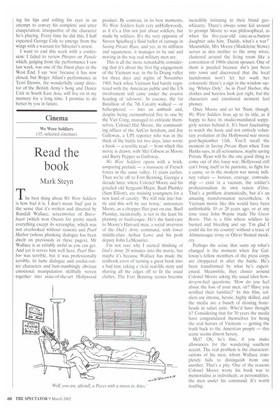Read the book
Mark Steyn
The best thing about We Were Soldiers is how bad it is. I don't mean 'bad' just in the sense that it's written and directed by Randall Wallace, screenwriter of Braveheart (which won Oscars for pretty much everything except its screenplay, which was not overlooked without reason) and Pearl Harbor (whose plonking dialogue has been dwelt on previously in these pages). Mr Wallace is as reliably awful as you can get. And yet it serves him well here. Pearl Harbor was terrible, but it was professionally terrible, its lame dialogue and cookie-cutter characters and butt-numbingly obvious emotional manipulation skillfully woven together into state-of-the-art Hollywood
product. By contrast, in its best moments, We Were Soldiers feels very unHollywoody, as if it's a film not just about soldiers, but made by soldiers. It's the very opposite of Steven Spielberg's fluid ballet of carnage in Saving Private Ryan, and yet, in its stiffness and squareness, it manages to be sad and moving in the way real military men are_ This is all the more remarkable considering that it's about the first big engagement of the Vietnam war, in the Ia Drang valley for three days and nights of November 1965, back when Vietnam had barely registered with the American public and the US involvement still came under the evasive heading of 'advisors', In essence, the 1st BataIlion of the 7th Cavalry walked — or helicoptered — into an ambush and, despite being outnumbered five to one by the Viet Cong, managed to extricate themselves. Colonel Hal Moore, the commanding officer of the AirCav hotshots, and Joe Galloway, a UPI reporter who was in the thick of the battle for two days, later wrote a book — a terrific read — from which this movie is drawn, with Mel Gibson as Moore and Barry Pepper as Galloway.
We Were Soldiers opens with a brisk, unsparing prelude — a massacre of French forces in the same valley. 11 years earlier. Then we're off to Fort Benning, Georgia a decade later, where Colonel Moore and his grizzled old Sergeant-Major, Basil Plumley (Sam Elliott), are training youngsters for a new kind of cavalry. 'We will ride into battle and this will be our horse,' announces Moore, as a chopper flies past on cue. Basil Plumley, incidentally, is not in the least bit plummy or basil-esque. He's the hard-case to Moore's Harvard man, a social inversion of the Dad's Army command, with lower middle-class Arthur Lowe and his posh deputy John LeMesurier.
I'm not sure why I started thinking of Dad's Army 20 minutes into the movie, but maybe it's because Wallace has made the textbook error of turning a great book into a had text, taking a vivid real-life story and shaving all the edges off to fit the usual clichés. The Fort Benning scenes become incredibly irritating in their bland geewhizzery. There's always some kid around to prompt Moore to wax philosophical, as when his five-year-old cute-as-a-button daughter asks him, 'Daddy, what's a war?' Meanwhile, Mrs Moore (Madeleine Stowe) serves as den mother to the army wives, clustered around the living room like a convention of 1960s sitcom spouses. One of them is puzzled because she's just been into town and discovered that the local laundromat won't let her wash her coloureds: there's a sign in the window saying 'Whites Only'. As in Pearl Harbor, the clothes and hairdos look just right, but the characters and emotional moment feel phoney.
Once Moore and co hit 'Nam, though, We Were Soldiers lives up to its title, as if happy to have its studio-mandated soppygirly scenes behind it. It's been fascinating to watch the hasty and not entirely voluntary evolution of the Hollywood war movie post-September 11th. You'll recall the moment in Saving Private Ryan when Tom Hanks says, in all seriousness, maybe saving Private Ryan will be the one good thing to come out of this lousy war. Hollywood still can't bring itself to be patriotic, to fight for a cause, so in the modern war movie military values — honour, courage, comradeship — exist in a vacuum, the soldier's professionalism its own raison d'être. That's a problem dramatically, but it's an amazing transformation nevertheless. A Vietnam movie like this would have been unthinkable 10 or 20 years ago, or at any time since John Wayne made The Green Berets. This is a film where soldiers lie burned and bleeding and say 'I'm glad I could die for my country' without a trace of Altmanesque irony or Oliver Stoned mockery.
Perhaps the scene that sums up what's changed is the moment when Joe Galloway's fellow members of the press corps are choppered in after the battle. He's been transformed by what he's experienced. Meanwhile, they cluster around Colonel Moore asking the usual idiot howdo-you-feel questions: 'How do you feel about the loss of your men, sir? Have you notified their families?' In this film, soldiers are intense, heroic, highly skilled, and the media are a bunch of droning boneheads in safari suits. Who'd have thought it? Considering that for 30 years the media have congratulated themselves for being the real heroes of Vietnam — getting the truth back to the American people — this scene seems almost heresy.
Mel? Oh, he's fine, if you make allowances for the wandering southern accent. The real problem is the characterisations of his men, whom Wallace completely fails to distinguish from one another. That's a pity. One of the reasons Colonel Moore wrote his book was to memorialise as individuals, as personalities, the men under his command. It's worth reading.














































































 Previous page
Previous page